Bake sale, borscht and bouncy castles
A September tradition in British Columbia is returning with the Mennonite Central Committee (MCC) B.C. Festival for World Relief, scheduled in Abbotsford on Sept. 17 and 18.
A September tradition in British Columbia is returning with the Mennonite Central Committee (MCC) B.C. Festival for World Relief, scheduled in Abbotsford on Sept. 17 and 18.
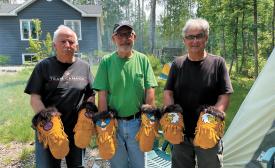
MDS Canada volunteers Joe Bless and Nic Hamm of Vineland United Mennonite Church, and Dave Brubacher of Grace Mennonite Church in St. Catharines, with the special mitts given them by the MCC Indigenous Neighbours program as a token of thanks for their work on the MCC office in Timmins, Ont. (Photo by Lyndsay Mollins Koene)
In light of the news about the unmarked graves of children at former residential schools in B.C., Saskatchewan and other parts of the country, the work of Mennonite Disaster Service (MDS) Canada at the Mennonite Central Committee (MCC) Indigenous Neighbours office in Timmins, Ont., took on new resonance for volunteers.
A proposal made by Toronto United Mennonite Church’s worship committee has evolved into a new podcast project called “TUMC On Air.”
Hosts Peter Haresnape and Michele Rizoli, the church’s pastors, explore new ways of conducting church solely through audio. The podcast encourages congregational members to disengage their eyes and focus on listening.
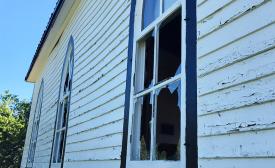
The former meeting place of Horse Lake Mennonite Church had some unwelcome visitors on the evening of June 21. Vandals threw rocks and bricks and broke every window of the historic site. (Photo courtesy of Patty Neufeld)
“When I first saw it, I thought, ‘We might as well burn it down.’” says Patty Neufeld, of the former Horse Lake Mennonite Church building. “It was really depressing.”
The church building was vandalized sometime during the evening of June 21. Though nothing appears to have been stolen, every window in the 111-year-old building was broken.
Following the recent move to Stage 3 of the provincial Covid Restart Plan, some Mennonite Church B.C. congregations are gladly worshipping in person once again.
After two years of construction, a pandemic, and a decade of dreaming and planning, Conrad Grebel University College’s new kitchen and renovated dining room are complete. More than a thousand donors contributed more than $4.2-million to the Fill the Table capital campaign to make it happen.
If you see someone cycling in Winnipeg, toting behind them stacks of lumber, buckets of paint or even a ladder, it’s probably a member of Velo Renovation. They are used to the double takes they get at supply stores.
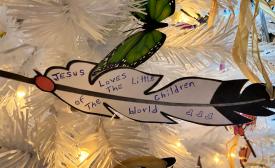
Some residents of Bethany Manor chose to write on their feathers. This one reads: ‘Jesus loves the little children of the world.’ (Photo by Angela Schmiemann)
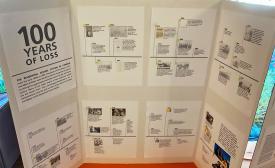
Angela Schmiemann created this timeline depicting the history of Indian Residential Schools as part of an interactive display at Bethany Manor, a seniors residence in Saskatoon. (Photo by Angela Schmiemann)
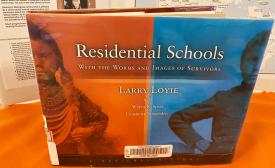
Books about residential schools borrowed from the local public library added to the display and enhanced the seniors’ learning experience. (Photo by Angela Schmiemann)

Residents were invited to wear an orange ribbon in support of Indigenous families and communities who lost children to the residential school system. (Photo by Angela Schmiemann)
What do a handful of library books, a white Christmas tree and coloured paper feathers have in common? They were all part of an interactive educational response to the injustice of Indian Residential Schools.
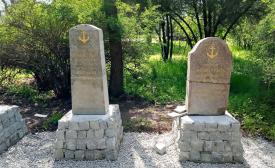
Two Mennonite gravestones were pieced back together and restored for the memorial. (Photo by Max Shtatsky)
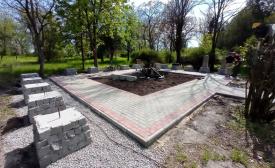
The Mennonite memorial will feature 15 of the 120-plus headstones that were recovered from the foundation of an old barn. (Photo by Max Shtatsky)
Two years ago, a Ukrainian researcher began excavating the foundation of a dilapidated brick barn in Zaporozhye, Ukraine. Using shovels and picks, he began to unearth the rubble. Then he started to notice the German inscriptions on the broken stones. These turned out to be Mennonite gravestones.
Congregations will resume some sort of gathering after the major concerns about COVID-19 are minimized and regulations are relaxed. Talk of getting “back to normal” is common. What will the new normal look like?

Clockwise from bottom, Don Neufeld, the editor of Peaceful at Heart; David Blow, Mennonite Central Committee program associate, top left; and Rod Friesen, an MCC restorative justice program coordinator, plan their agenda for week four of the online book club they facilitate dealing with healthy masculinity. (Screenshot by Rod Friesen)
For years Don Neufeld dreamed about providing a space where men could explore healthy masculinity from an Anabaptist/Mennonite perspective. During the month of June he co-facilitated an online book study for a diverse group of men, using a resource he co-edited with Steve Thomas, called Peaceful at Heart: Anabaptist Reflections on Healthy Masculinity.
It takes 250 plastic milk bags to make a one-metre-x-two-metre washable, waterproof sleeping mat. And it takes hours of volunteer work to flatten, cut, loop and weave strips of the bags together.
A group of men from Wilmot Mennonite Church has been doing this work for years, sending the finished mats to Christian Aid Ministries in Moorefield, Ont., to be distributed mostly overseas.

A community highlight of the year came with a Taskmaster event. The students were told to dress in school colours, and they entered the festive auditorium to discover that classes had been cancelled and the whole day was filled with unique challenges. (Photo courtesy of UMEI)

UMEI's future music teacher, Erin Armstrong is the founder and director of Music Moves Kids and Abridged Opera, conductor of the Windsor Community Choir, music director of Leamington United Church, and a regular performer/collaborator with the Windsor Symphony Orchestra. (Photo courtesy of Erin Armstrong)
Last year was supposed to be full of celebrations for the 75th anniversary of UMEI Christian High School (formerly United Mennonite Educational Institute). Instead, the pandemic shut things down right after the first big event, a coffee house of music and drama by staff and alumni of the small Mennonite school.
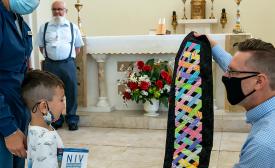
Ron Guenther, MDS’s director of operations, right, presents a quilt to Misty Minshew and her son on May 20 during a dedication service for the last 13 homes in the Tierra de Esperanza, or “Land of Hope,” community in Woodsboro, Texas, four years after Hurricane Harvey wreaked havoc on the area. (MDS photo by Paul Hunt)
Mennonite Disaster Service (MDS) and Disaster Aid Ohio, in partnership with the Coastal Bend Disaster Recovery Group, dedicated the last 13 homes in the Tierra de Esperanza, or “Land of Hope,” community in Woodsboro, Texas, on May 20, bringing to completion an unprecedented three-year effort.
Each year in the Christian worship: Theory and practice class at Anabaptist Mennonite Biblical Seminary, students spend a couple of weeks considering rituals.

Two youth connectors from the Edmonton Mennonite Centre for Newcomers—Emmanuel Mbonimpa of the Congo, left, and Amena Shehab of Palestine, right—delivered 131 hygiene kits to the Mennonite Central Committee Alberta office on behalf of immigrant and refugee youth volunteering at the newcomers centre. Donita Wiebe-Neufeld, MCC Alberta’s development coordinator, centre, was on hand to receive the kits. (Photo by Joanne De Jong)
Edmonton newcomer youth from seven countries raised funds and assembled 131 hygiene kits for Mennonite Central Committee (MCC) recently.
“I don’t think that anybody can relax until we actually hear the words ‘royal assent.’ I think we have to be all over this,” says Jennifer Preston, general secretary for Canadian Friends Service Committee (CFSC), the peace and social justice agency of Quakers in Canada.
As the pandemic continues, all in- person church programs have been cancelled and new ways of staying connected have been established. Sunday School and youth events have gone online. Committee meetings are on Zoom. Sunday morning worship services are accessed in various ways.
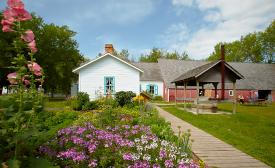
Photos by Jerry Grajewski, Grajewski Fotograph, Inc.
The Chortitz Housebarn is one of the Mennonite Heritage Village’s signature heritage buildings. It will undergo a major restoration this summer, for which the MHV is currently raising funds. Its goal is 50 percent of the renovation costs—just over $22,000.
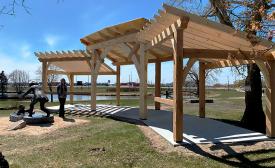
Photo courtesy of Mennonite Heritage Village
This newly constructed pergola and the Dirk Willems statue will make up the new Peace Exhibit, along with the Dirk Willems Peace Gardens and pond that are being developed this summer. When it is complete, this area of the MVH grounds will feature interpretation about the Mennonite theology of peace, contemplative places for visitors to sit and rest away from the bustle of the main street in the village and more trails for walking.

The new Mennonites at War exhibit at the Mennonite Heritage Village is currently scheduled to open on July 10 (subject to public health restrictions in place at that time) and will run until Nov. 14. It will be available to view in-person and in a 360-degree virtual tour.
Although the Mennonite Heritage Village (MVH) may look like it’s frozen in time, it has adapted impressively to the challenges of the 2020s.

This restored Allis-Chalmers D14 tractor was the top-selling non-quilt item at the recent online relief sale. (Photo by John Reimer)
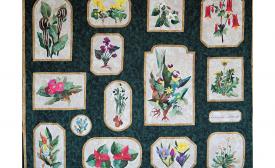
This feature quilt, sold by auction virtually for $8,300, was the top-selling item at the 2021 New Hamburg Mennonite Relief Sale. (Photo by Ken Ogasawara)

People who purchased “NHMRS-in-a-Box” received commemorative mugs, a fresh pie and fresh coffee from a local company, as a way to recreate part of the relief sale experience. (Photo by Ken Ogasawara)
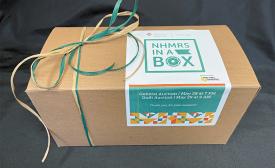
Supporters of the Relief Sale were encouraged to buy part of the experience in a box. The boxes, containing commemorative mugs, a fresh pie and fresh coffee, sold out in a few days. (Photo by Sheryl Bruggeling)

These kits were given out to sponsors as part of the Run for Relief-Run it Your Way event. (Photo by Justin Armitage)
The New Hamburg Mennonite Relief Sale (NHMRS) that raises funds for Mennonite Central Committee (MCC) had to adapt and innovate once again, as pandemic restrictions in Ontario prohibited large gatherings for the second year in a row.
Since 2012, the “Germinating Conversations” initiative has brought together small farmers, bigger farmers and urban folks who care about food.

Despite the pandemic, Samih Saltah and Katherine Kandalaft managed to plan a special wedding in 2020. (Photo courtesy of the bridal couple)

A masked videographer captures the wedding ceremony of Katherine Kandalaft and Samih Saltah last Oct. 12, reflecting the new reality during the COVID-19 pandemic. (Photo courtesy of the bridal couple)
The bride and groom may have hoped for a traditional church wedding with an entourage of attendants, surrounded by all their friends and extended family, followed by a fabulous catered wedding dinner. What they ended up with might have been a scaled-down gathering of fewer than a dozen people and a simple backyard meal with everyone wearing masks, or even a drive-by, no-contact reception.
“What questions does cohabitation raise for you?” asked Irma Fast Dueck at a Portable CMU event hosted by Springridge Mennonite Church in Pincher Creek, Alta., in May.
“Manitoba book store censors retired pastor’s book” was the title of a press release sent to Canadian Mennonite earlier this year by author Ray Friesen, a retired Mennonite pastor in Swift Current, Sask.